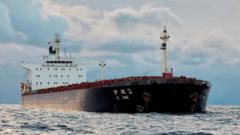Amidst increasing tensions, Sweden is looking to clarify circumstances surrounding the recent damage to undersea cables in the Baltic Sea potentially connected to a Chinese ship.
Sweden Seeks China’s Assistance in Investigating Severed Undersea Cables

Sweden Seeks China’s Assistance in Investigating Severed Undersea Cables
Sweden's request for cooperation from China follows damage to two significant undersea cables, linked to the presence of a Chinese vessel in the area.
Sweden has formally requested cooperation from China to investigate the recent severing of two undersea cables in the Baltic Sea that occurred on 17 and 18 November. The cables involved connect Sweden to Lithuania and Finland to Germany. The Chinese vessel Yi Peng Three was reportedly present in the vicinity at the time of the incidents and has since anchored in international waters near Denmark.
While investigations indicate that the Yi Peng Three may have caused the damage by anchoring over the cables, China has firmly denied any involvement in sabotage. The timeline shows that the ship departed from Ust-Luga in Russia on 15 November, and significant damage to the Arelion cable occurred on 17 November, followed by damages to the C-Lion 1 cable on 18 November. Ship tracking data suggests the vessel disturbed the seabed for an extended period, leading to the cables' disconnection.
Swedish Prime Minister Ulf Kristersson has officially requested China's cooperation to establish clarity regarding these incidents, expressing the need for transparency and information from Beijing. He also mentioned the need to inspect the Yi Peng Three if it returns to Swedish waters, emphasizing that this request should not be interpreted as an accusation against China.
The overarching diplomatic tension in the region has been exacerbated by related incidents, including the Nord Stream sabotage in 2022 and damage to another telecom cable between Estonia and Sweden in October 2023. German Defense Minister Boris Pistorius indicated that suspicions of sabotage permeate these incidents, while Russia has dismissed claims of involvement as absurd. As geopolitical stakes rise, the investigation into the severed cables remains crucial for security in the Baltic region.
While investigations indicate that the Yi Peng Three may have caused the damage by anchoring over the cables, China has firmly denied any involvement in sabotage. The timeline shows that the ship departed from Ust-Luga in Russia on 15 November, and significant damage to the Arelion cable occurred on 17 November, followed by damages to the C-Lion 1 cable on 18 November. Ship tracking data suggests the vessel disturbed the seabed for an extended period, leading to the cables' disconnection.
Swedish Prime Minister Ulf Kristersson has officially requested China's cooperation to establish clarity regarding these incidents, expressing the need for transparency and information from Beijing. He also mentioned the need to inspect the Yi Peng Three if it returns to Swedish waters, emphasizing that this request should not be interpreted as an accusation against China.
The overarching diplomatic tension in the region has been exacerbated by related incidents, including the Nord Stream sabotage in 2022 and damage to another telecom cable between Estonia and Sweden in October 2023. German Defense Minister Boris Pistorius indicated that suspicions of sabotage permeate these incidents, while Russia has dismissed claims of involvement as absurd. As geopolitical stakes rise, the investigation into the severed cables remains crucial for security in the Baltic region.





















